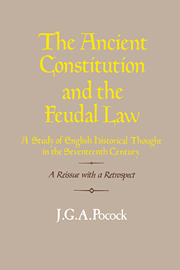 The Ancient Constitution and the Feudal Law
The Ancient Constitution and the Feudal Law III - Restoration, Revolution and Oligarchy
Published online by Cambridge University Press: 18 November 2009
Summary
THE ANCIENT CONSTITUTION'S ROLE IN CONTROVERSY TO THE SETTLEMENT of 1689
IN the remainder of this retrospect I shall review the closing chapters of the book, in particular those which deal with the controversy of the 1680's and proceed to consider the role of historic constitutionalism in the period from 1690 to 1790 (and after). A great deal of research and publication has gone on since 1957, and is still going on; it is not too much to say that our understanding of John Locke, of the Revolution of 1688–9, and of the main lines of English and Scottish political argument in the eighteenth century, has been transformed and is still fluid. The last chapter of my 1957 text, ‘Conclusion: 1688 in the history of historiography’, is now less a conclusion than a curiosity, and in re-issuing the book an attempt must be made to bring it up to date. This in turn cannot be done without some review of the penultimate chapter, which deals with ‘the Brady controversy’, ‘the Filmerian controversy’, or ‘the Exclusionist controversy’—terms which are never quite interchangeable—and with the still-vexed question of the relation between John Locke's role as an actor in these controversies and his role as a publicist and author after 1689.
- Type
- Chapter
- Information
- The Ancient Constitution and the Feudal LawA Study of English Historical Thought in the Seventeenth Century, pp. 335 - 388Publisher: Cambridge University PressPrint publication year: 1987
